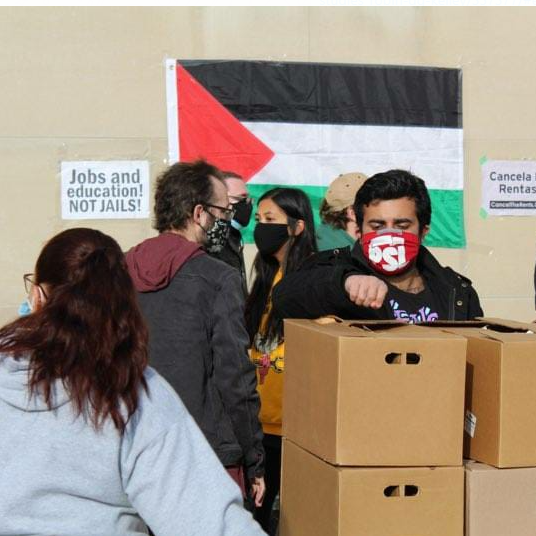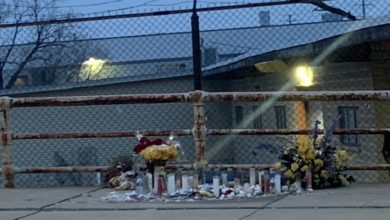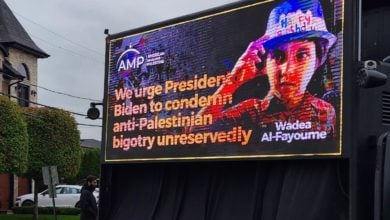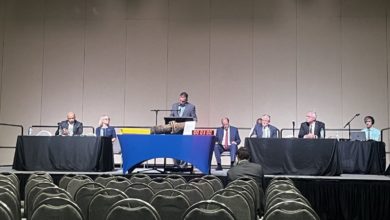On the brisk morning of Nov. 21, people gathered to set up for a monthly food distribution organized by People United Albany Park and the Party for Socialism and Liberation. This monthly food distribution, held in the parking lot of Our Lady of Mercy Church in the Albany Park neighborhood of Chicago, has helped provide food for more than 100 families since the beginning of the pandemic.
PUAP was organized as a result of the COVID-19 pandemic, the struggle for immigrants and to defend of working-class people during the current economic crisis. Albany Park is a diverse working-class neighborhood with one of the highest percentages of foreign-born residents in Chicago. While COVID-19 restrictions and the ensuing economic crisis cut off the majority of the population from medical services, food, housing and education, PUAP quickly organized to help alleviate the problem of food insecurity that many are facing due to the record number of people unemployed in this country. The rapid response in forming this neighborhood coalition — comprised of multinational workers, students, parents, activists and organizers — was in large part thanks to the work of Centro Autonomo, the Albany Park community center founded in 2006, which has deep roots in the community.
Liberation News Spoke to Gerardo, an organizer with Centro Autonomo about the work the organization has been doing over the years: “Centro Autonomo was founded in Albany Park at a time when we were trying to figure out what the community needed and we wanted to empower community members as much as we could and change the model for what a community center could be. Before the pandemic, we used to hold monthly juntas, or meetings, for community members to come discuss the issues that they are currently dealing with.”

Gerardo continued, telling Liberation News that the community center was based around collective action: “The whole point of the juntas was not to just talk about the issues but to collectively come up with actions we can take to resolve them. For example, one of the actions that came out of the juntas was community English classes. Many of our community members wanted to learn English to help them find jobs. Another program we started was an adult education program centered around computer proficiency, teaching people how to navigate operating systems and use applications such as Microsoft Office.”
When asked how Centro Autonomo had adapted to the pandemic, Gerardo told Liberation News: “Since the pandemic began we haven’t been able to hold in-person juntas but we are still receiving community input at our monthly food distribution and have continued to give education classes to our community members through Zoom during the pandemic.”
As community members began to roll in to pick up the boxes of food which had been neatly stacked on tables by volunteers, they were asked to fill out a form to provide contact information and feedback on current needs that PUAP can help them address.
Liberation News spoke to Carmen Garnello about some of the struggles she and her family have been facing during the pandemic: “My family has been fortunate to be physically fine during the pandemic, safe and healthy. But we are struggling because my husband and I lost our jobs at a local restaurant and it has been hard to pay bills.” When asked about the food distribution, Carmen continued: “The groceries help us a lot, even its for just a week, they help us save for other bills.”
Eight months into the pandemic, with no relief in sight from the federal government, the working-class and oppressed people of the United States have been confronted with multiple crises at once.
Liberation News spoke to Gladis Palacios about the difficulties of paying rent: “My husband lost his job at the beginning of the pandemic and it has been very difficult for my family. Our biggest struggle is paying our rent every month. It would be good if we could have some economic help to pay for rent and medicine, as my family is struggling to pay these bills.”
Others community members also spoke to Liberation News about medical bills. Anita Wood, who moved to the city at the beginning of the pandemic in search of a job, told Liberation News about the physical and psychological toll of the pandemic: “I haven’t been doing well. I’ve been severely depressed and have been taking medication for that. I have really been struggling to pay for my medication and so we could really use some help with that. My mom and I take quite a few medications and it’s been tough, especially this past month. It doesn’t help when you’re stuck inside all the time,and it especially doesn’t help if you don’t have any money for the medicine you need.”
While the monthly food distribution certainly helps alleviate some of the burden people are facing, it cannot replace monetary assistance from the federal government, which is what is needed most at this time. Feeding America, the largest hunger-relief organization in the United States, estimates that 17 million people in the country could become food insecure because of the pandemic, bringing the total to more than 54 million people in the country, including 18 million children. Before COVID-19, food insecurity was at its lowest since the Great Recession, but it still impacted 37 million people. When asked how long, on average, the groceries last her family, Palacios told Liberation News: “Depending on what they give us, the food lasts three to five days.”
While most people know of the one-time $1,200 check which was sent as part of the CARES Act, what many don’t realize is not everyone got the money. Gerardo told Liberation News about the institutional discrimination faced by the immigrant community in this country: “People have been given crumbs in terms of economic relief during this pandemic. The government has put in a lot of barriers which bar people from collecting the economic relief. For example, if you are a natural-born citizen and are married to an undocumented person and you filed taxes jointly, then you automatically disqualify from getting any assistance from the government. Rules such as this one, disqualify most of the Albany Park community from receiving any economic relief.”
Without any help from the government during this devastating pandemic, the people of Albany Park have had to rely on each other, anchored by grassroot organizations such as PUAC. Carmen Garnello told Liberation News: “As a community we should come together to help each other and offer what we have to give to those in need. Giving food, clothing and masks to those who need it. And those who are healthy should help to take care of the elderly and the sick.”
Click here to donate to People United Albany Park.






